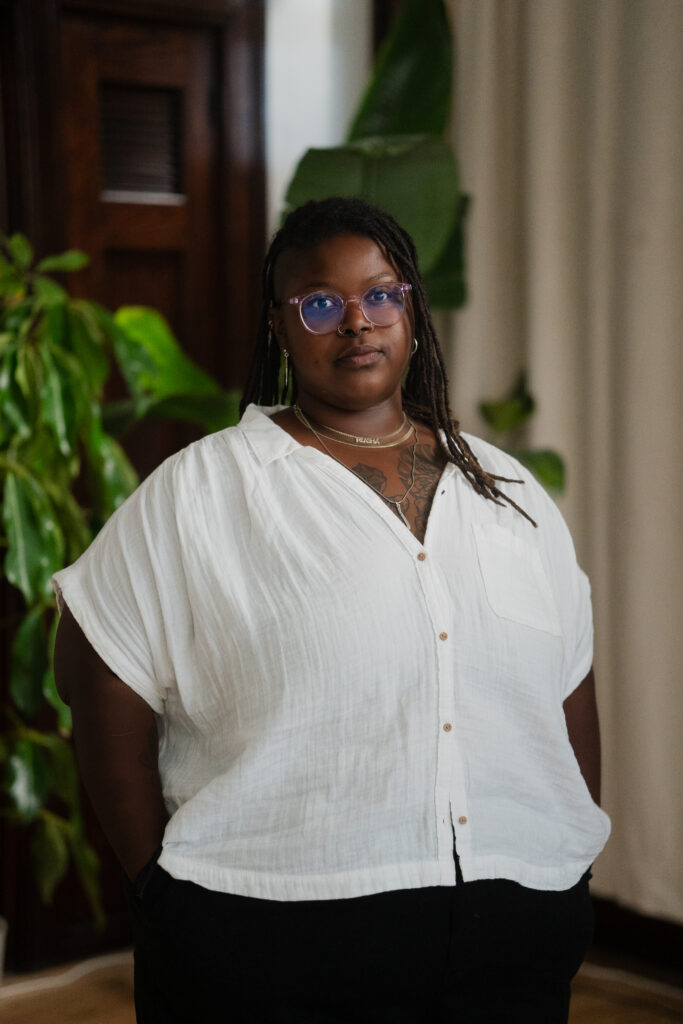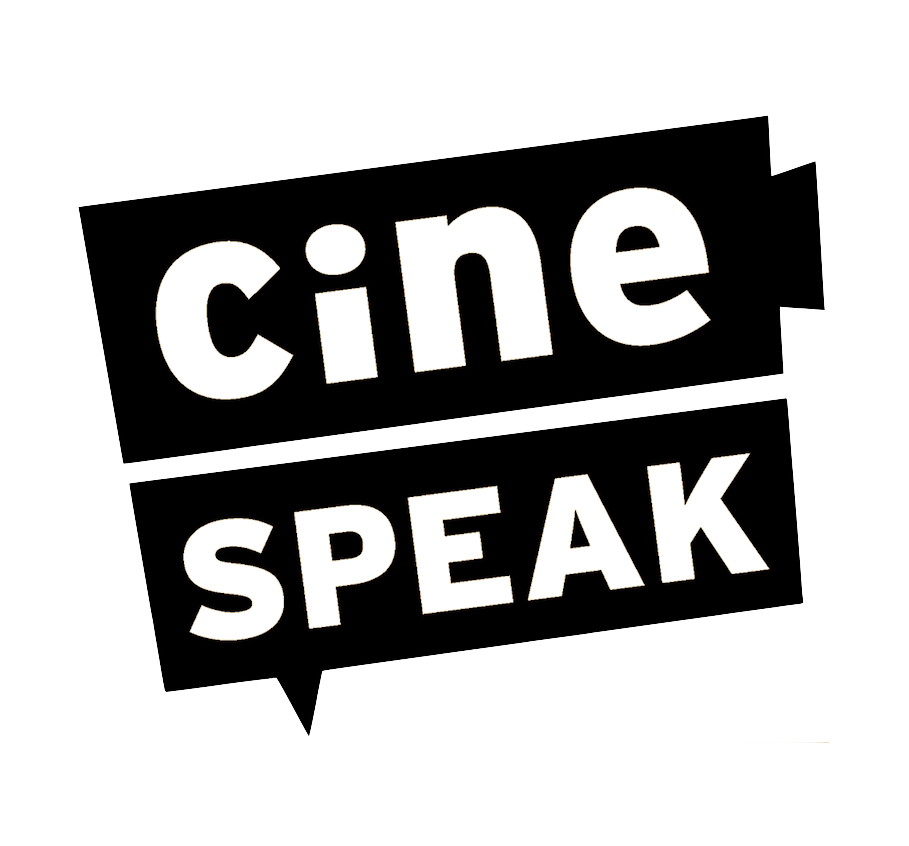
30 May Philadelphia Artist Spotlight: Kenzä Bousseloub
BY IREASHIA BENNETT
The cinéSPEAK Journal publishes a monthly Philadelphia Artist Spotlight highlighting local filmmakers and moving image artists doing unique and impactful work.
Kenzä Bousseloub كنزة بوسلوب uses various forms of visual storytelling to explore the nuances of womanhood, the generational impact of colonization on Algerian genealogies, and healing practices through personal stories. Her love for photography and journalism–both of which allow her to get a closer view of the authentic lived experiences of others–led her to explore documentary filmmaking.
Based in Philadelphia, her work has screened at Black Box, Vox Populi, and Film Diary NYC, while her photography has been featured globally in various publications. Her film Beauty in the Chaos (2023) is an immersive and atmospheric view into intimate moments spent with family, featuring vignettes of traditional wedding rituals in Algeria. Her most recent documentary film, Nissa’a Djazaïriat, Voices of East Algeria, casts a tender gaze on the lives of Algerian women living in the towns Mila and Setif who share their experiences of the Algerian War of Independence. In addition to crafting deeply intentional films, she is also a member of Batikh Batikh, “an artist collective, pop-up cinema, and gallery centering South West Asian North African (SWANA) women, queer, and local artists in Philadelphia.”
The cinéSPEAK Journal spoke with Kenzä Bousseloub about her film Nissa’a Djazaïriat, Voices of East Algeria, her inspirations, and what keeps her coming back to film.
cinéSPEAK: What inspired you to be a filmmaker and media artist?
Kenzä Bousseloub: In college, I was studying media studies and production and found that many of my professors had a film background. At the same time, I was taking a few film classes for fun. So I had hands-on experience with creating film projects. I was introduced to independent cinema and the idea that anyone can make a film. That’s when I decided to take filmmaking more seriously in my practice.
Around the same time, I discovered my love for photography. I first started documenting family and life in Algeria back in 2017 and was documenting everything on an iPhone. A year later, a friend gave me an old point-and-shoot camera, and every year since then I have been documenting family and people whenever I go back. I took my camera everywhere with me; it almost felt like it was attached to my body or a part of me. I was the only woman in the town walking around with a camera, so it was definitely odd for locals to see. It made people curious about what I was documenting, which often led to spontaneous encounters where people would approach me, sparking a mutual interest and making genuine connections.
My work and my approach to documenting others tend to be kind of spontaneous or on the spot, even in my films. I want the moment to be as organic as possible and for people to be completely themselves. But at the same time, I am very intentional with who I point my camera to. To me, it’s really important when people are comfortable around me, whether I am photographing or filming. It is so powerful to be able to document something in the moment that will never be again. To freeze time and look back at it in the future and to have those memories forever. That is why I love cinema and photography.

Still from Nissa’a Djazaïriat, Voices of East Algeria. Courtesy of Kenza Bousseloub.
cinéSPEAK: How did you get started on your recent film project?
KB: My recent documentary film, Nissa’a Djazaïriat, Voices of East Algeria, was created during my third year of college while delving into the realm of documentary filmmaking. My fascination with narratives surrounding the Algerian War of Independence, colonization, and the communal rituals and traditions of women inspired me to create this film. Growing up surrounded by women and my deep connection to land, I felt I needed to further explore these themes.
With this film, my aim was to delve into the cultural and gendered context of Algerian women, showcasing their lives authentically, with all their beauty and complexities. The film offers an intimate journey, inviting viewers to truly listen and empathize with the women as they share their stories. My goal is to create a sense of connection between the audience and the women.
Structured in three parts, the film explores important aspects of Algerian womanhood. The first woman, Khadijah, recounts her experiences during the Algerian War of Independence. Bayah, the second woman, shares her journey on becoming a folk healer. Finally, Hassiba shares a glimpse into the rituals of womanhood through her traditional wedding ceremony. Each woman embodies an aspect of how women take care of their community and their land.
cinéSPEAK: What topics and themes are you exploring in your current work?
KB: Over the past few years, I have dedicated myself to exploring the nuances of womanhood in my work and continue to do so. This is a continuous project, and my goal is to have an archive of narratives from Algerian women, with the intention of preserving these stories for future generations.
I am also currently exploring memory, family archives, erasure, and colonization in archives and oral history in Algeria. I am currently in the process of creating a film that explores all of these themes. The story is in the very early phase of development and it is very personal to me, so I am nervous but excited to see where this will take me.

cinéSPEAK: How has Philadelphia shaped and influenced the process and content of your work?
KB: Most of my inspiration comes from the arts and culture scenes in Philly. Philly is very diverse and full of so much beauty. Growing up here, I was exposed to all kinds of communities, ethnicities, and groups of people, all of which influenced the way I see the world.
I am constantly inspired by my friends and artists around me who are also creating amazing work in this city. I feel extremely grateful to have found a community of filmmakers and artists in Philly who I can connect with and who genuinely want to see me grow. There are so many people that are willing to help and spaces dedicated to helping artists. That’s what I love most about this city.
cinéSPEAK: What impact do you hope your work will have in the Philadelphia community?
KB: I hope my work can [help] other artists, filmmakers, and photographers–especially from the SWANA and African diaspora–to feel connected to their roots and to feel a sense of community and belonging in Philly. I want to show that our stories and voices matter too. Especially now, being a part of Batikh Batikh Collective, which celebrates and supports SWANA artists in Philadelphia, I hope to continue to help bring people together so we can understand each other a little more.
If you want to keep up with Kenzä Bousseloub’s work, you can check out her work here or follow her Instagram @kenoozaaa.
*Featured Image: Image of Kenza Bousseloub. Courtesy of Kenza Bousseloub.
Would you like to be featured in a future spotlight? Please fill out the Philadelphia Artist Spotlight form. The cinéSPEAK Journal maintains sole discretion over the publishing of any information provided via the form. Questions: journal@cinespeak.org

Ireashia M. Bennett (they/them) is a Philadelphia-based filmmaker, photographer, and writer whose work aims to celebrate Black queer and disabled folks in the form of new media, short films, and photoessays. They earned a B.A. in Journalism from Columbia College Chicago and are pursuing an MFA in Film and Media.

Sorry, the comment form is closed at this time.